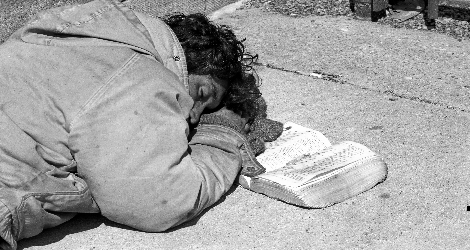Human nature and mutuality
In addition to different understandings of human purpose, modern economic theory and Christian theology have a different understanding of human nature. Human behavior can be best understood, according to economic theory’s anthropology, through an anticipation that each individual actor in any given human interaction is primarily motivated by two related questions: a) “How will this benefit/harm me?” and b) “How can I act to maximize the benefits that accrue to me in this interaction while minimizing the harm?”
Human behavior according to theological anthropology, on the other hand, comes down to a constant struggle between actions motivated by an unenlightened serving of self that is a response to fear and alienation from God, and an enlightened serving of God and others that is a response to our experience of God’s love. Theology claims that, with God’s help, we can indeed do the good we have been shown in Jesus Christ and, in so doing, participate in the life of God. Theological anthropology makes room, in other words, for normative human action that is motivated by an understanding and a cleaving to that which is good, beautiful and true for all time.
From the Bible’s viewpoint, “homo economicus” (the human as defined by capitalism) is simply the fallen condition through which we might begin to understand the origins and motivations for human sin. “Homo economicus” is who human beings are reduced to when they lose their connection to God, transcendent value, and God’s dreams for the world.
Thankfully, theological anthropology offers us an alternative self understanding that lifts us out of the identity the serpent would have had us adopt, and to our detriment. According to the Bible, we are made in the image of God. For our purposes, we will understand this to mean that we are made in the image of the One whose life is characterized by the loving, life-giving mutuality that characterizes the Trinity.
The mutual self-giving within the Trinity is a model for understanding and ordering economic relations. For, as in heaven, so shall it be on earth: once we recognize that we are made in the image of God—in the image of the Trinity—we must seek to ground our relationships, economic and otherwise, in the same mutual accountability, trust, community and service to the other that are exhibited among the three personae of the Trinity.
What are the implications of adopting an anthropology that honors the desire to nurture long-term relationships as much as the desire for material gain? First, we might return to policymaking a consideration of the common good. That is, we will think of policymaking in terms of the impact the policy has on the health, wealth and ability of all citizens to engage in fruitful long-term relationships. Second, we might begin to understand and articulate debates over taxation in terms of the opportunity to participate in the life-giving privilege of being our brother’s keeper, instead of characterizing it as “robbery of individuals by the government.” Third, we might begin to talk about regulation, not as a burden on the few, a hindrance that keeps individuals from exercising their rights, but as a way of protecting the many, of keeping some from injuring others with their “freedom,” which often translates into a willingness to sin.









I regret to say that I find Reverend Owen’s article frustrating. It would have been helped if she had started with a definition of capitalism. An acknowledgement of different types of capitalism would have clarified that her real beef is with totally laissez faire markets. One could then ask whether this is the political-economy we have, or whether it is an ideology vying to reshape our common life. This would have strengthened her argument which seems more oriented to reforming capitalism rather than replacing it with some other economic system.
She names Max Stackhouse as a defender laissez faire. She can only do this because she seems to have no idea what he affirmed or why. The choice, Stackhouse says, is between locating the economy in the family, the state, or the social space between them that had been carved out by the church – corporations. Separating the economy from the state allows states to engage in the sort of regulation she suggests in her conclusion.
Her characterization of is also unfair because Stackhouse brings considerable theological and ethical resources to bear to critique and humanize capitalism. Indeed, this is the church’s vocation! Engagement with his ideas would have clarified Owen’s muddle on the relationship between economics and theology. In all of this his is closer to a “New Deal” affirmation of capitalism than laissez faire. And so is she!